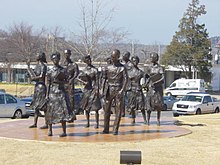A City Decides
| Movie | |
|---|---|
| Original title | A City Decides |
| Country of production | United States |
| original language | English |
| Publishing year | 1956 |
| length | 28 minutes |
| Rod | |
| Director | Charles Guggenheim |
| script | Mayo Simon |
| production | Charles Guggenheim & Associates Inc., Richard Heffron |
| camera | Victor Duncan |
A City Decides (German A city decides ) is an American documentary - short film by Charles Guggenheim from 1956, which in its division for one Oscar nominee.
content
At the beginning of the film it says: "Events that led to the integration of the Saint Louis public schools".
Under the collective name Brown v. Board of Education , five cases of racial segregation in public schools were tried by the United States Supreme Court from 1952 to 1954 . Affected parents filed class actions against four states and the federal district , in which the position was taken that the principle of equality of the constitution was violated by the fact that there are facilities for students separated by skin color. With its landmark judgment of May 17, 1954, the Supreme Court overturned the case law that had been in force for almost a hundred years.
The film shows that in St. Louis, as in other cities in the United States, it was difficult to respect and enforce the judgment, and that new classmates were exposed to attacks by white classmates. Narrow-minded hostility was the order of the day and made life difficult for the dark-skinned students. Understanding teachers tried to convey what gradually led to a different attitude.
Production notes
The film contains the note in the opening credits: “Courtesy of the Courtesy National Film Preservation Foundation, Library of Congress & Internet Archive”. It was sponsored by The Fund for the Republic supervised by Fleishman-Hillard, Inc. - Saint Louis. The film was shot in St. Louis , Missouri . The film was distributed by Universal Pictures. No professional actors act in the feature film scenes of the film. For Charles Guggenheim, who was nominated twelve times for an Oscar and won it four times, this was his first film to be nominated for the award. The documentary filmmaker is a leader in this field.
The ruling by the Supreme Court did not automatically mean an end to racial segregation. The path was taken, but it was still rocky and long and integration is still not as natural as it should be and racism is the order of the day.
reception
criticism
As William J. Sloan said, "The film was remarkable because, at least briefly, it exposed negatives' fears of sending their children to school with white children."
Award
At the Oscar ceremony in 1957 was Charles Guggenheim for his film in the category "Best Short Documentary" for an Oscar nomination, but which at Louis Clyde Stoumen and his film The True Story of the Civil War was that the theme of Civil War has to content.
Web links
- A City Decides in the Internet Movie Database (English)
- A City Cecides (1956) see page letterboxd.com (English)
Individual evidence
- ↑ The 29th Academy Awards | 1957 see page oscars.org (English)
- ↑ The Charles Guggenheim Collection see page web.archive.org (English)
- ↑ A City Decides (1956) see page filmpresrvation.org (English). Retrieved January 3, 2020 (English, including the original film).
